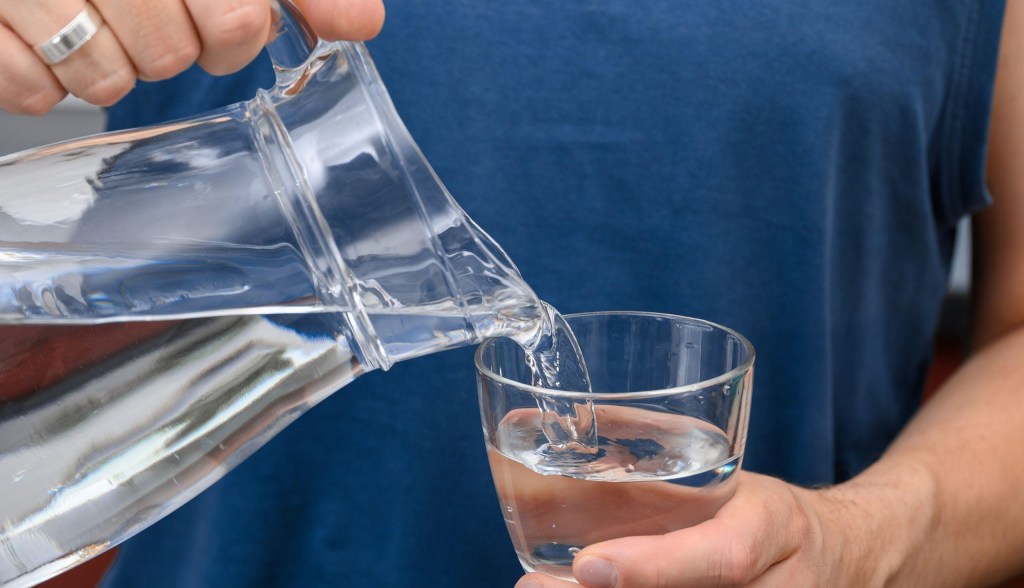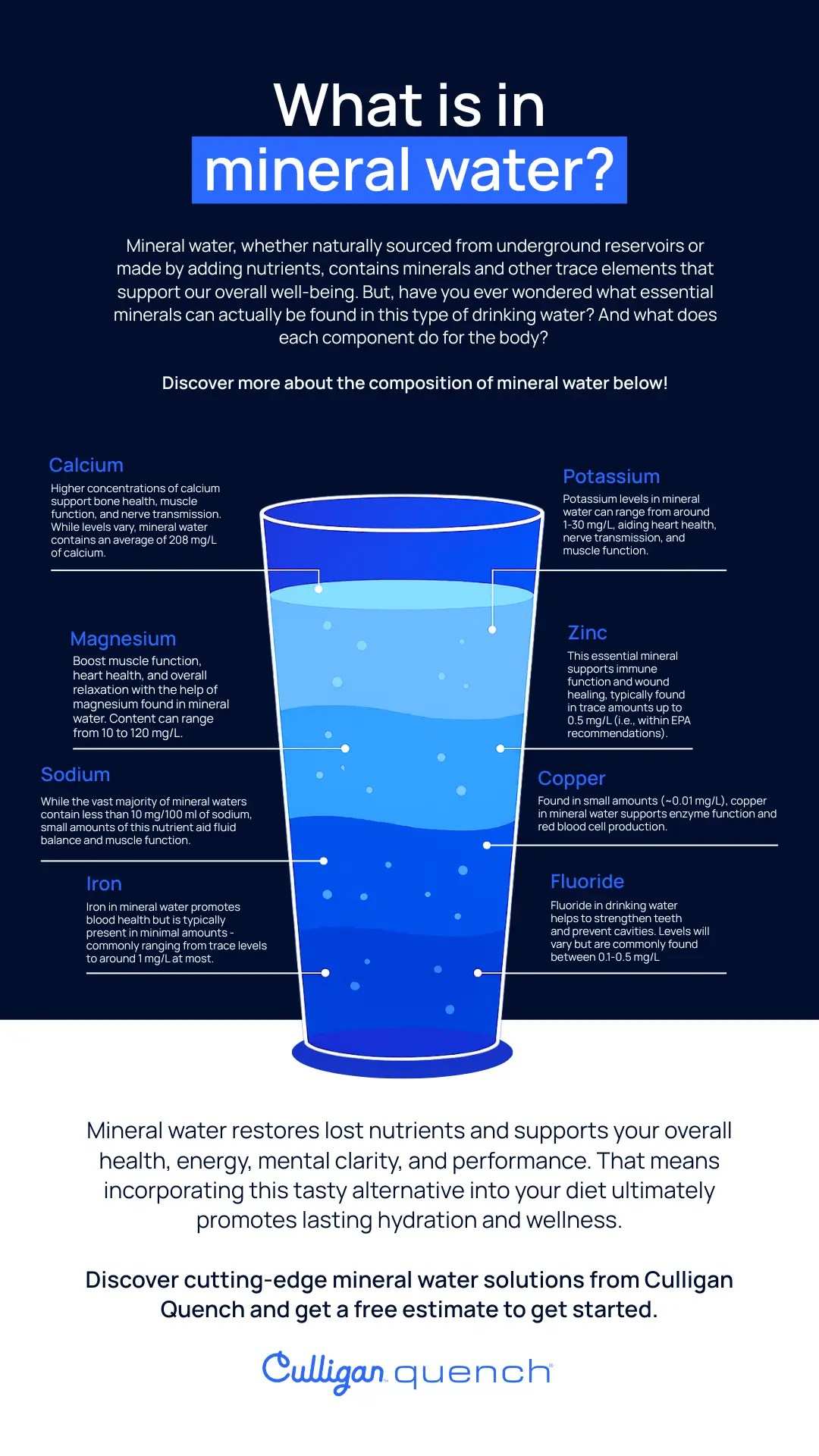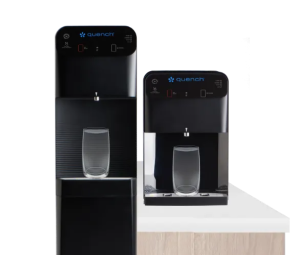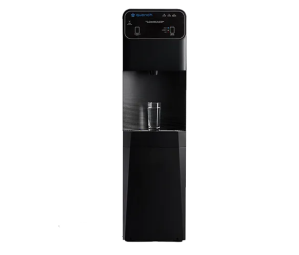
What is in mineral water? Exploring the pros and cons of daily mineral water consumption
In the daily quest for optimal health, the significance of staying hydrated can’t be overstated. Drinking enough water throughout the day is pivotal in maintaining bodily functions and mental clarity. And with a growing number of hydration options available, mineral water is becoming increasingly popular — enticing health-conscious individuals looking for a few extra benefits from their water.
Read on as we explore the value of drinking mineral water, the potential consequences of overconsumption, and how this water supply promotes greater daily hydration and sustained well-being.
What is mineral water?
Mineral water is essentially a water source that — unlike tap water — contains minerals and trace elements like calcium, magnesium, sodium, bicarbonate, sulfate, chloride, and fluoride. This type of drinking water can be derived from underground reservoirs or created by adding essential minerals to the supply at hand. According to the U.S. Food and Drug Administration, water is only considered mineral water if it contains at least 250 parts per million (ppm) total dissolved solids.

With so many drinking water options to choose from, here’s a quick breakdown of how mineral water differs from common alternatives:
- Tap water: Regular water is distinct in that it’s supplied through municipal systems and doesn’t contain mineral content offered by mineral water sources. What’s more, this often means the water supply is subject to additives or contaminants based on your local water treatment processes.
- Spring water: When it comes to spring water, this alternative originates from a natural spring or underground source — often perceived as pure because of its natural filtration process. This type of drinking water may contain natural minerals, but it generally does not meet the ppm requirement to be classified as mineral water.
- Distilled water: Distilled lacks minerals and impurities altogether, created through a distillation process that involves boiling water and collecting the steam. This water type is typically recommended for specific applications requiring pure water or medical use, rather than drinking.
- Soda water: While both mineral water and soda water can be carbonated by adding pressurized carbon dioxide gasses, plain carbonated soda or seltzer water isn’t a natural source of essential minerals.
The rise in mineral water demand
Recent years have seen a rise in demand for mineral water as a source of daily hydration. This surge in popularity is attributed to a few key reasons, including:
- Consumers’ increasing focus on wellness and a shift towards healthier beverage choices.
- An increasing demand for sustainable and innovative products.
- Rising concerns about additives or contaminants in tap water.
- The widespread adoption of technology.
Per a LinkedIn report, the projected global Mineral Water market size is set to reach multimillion-dollar figures by 2030. This growth showcases an unexpected and significant compound annual growth rate between 2023 and 2030 compared to what was observed in 2021.
Key health benefits of drinking mineral water
Considering the flourishing interest in mineral water, here are some of the top health benefits drinkers can expect as a result:
1. Improved mineral intake
Mineral water is a rich source of essential minerals like calcium, magnesium, and potassium — all of which are crucial for optimal health and bodily functions. These healthy minerals are a linchpin in maintaining bone strength, muscle function, nerve transmission, and more. Regular consumption is both a convenient and effective way to meet daily mineral requirements.
2. Enhanced hydration
With its natural composition and mineral content, this type of water is ideal for promoting superior hydration compared to regular water. The presence of minerals like magnesium and potassium supports better absorption and retention of water within cells, which is essential for replenishing electrolytes lost throughout the day. Improved hydration leads to higher energy levels, better endurance, and enhanced overall bodily functions.
3. Better digestive health
The mineral composition of mineral water, particularly magnesium sulfate and bicarbonate, can aid digestion. These dissolved minerals may help alleviate indigestion, constipation, or other digestive discomforts by promoting smoother digestion and supporting a healthier gut environment.
4. Stronger bones
Mineral water is rich in calcium and magnesium, which, the National Institutes of Health highlights, supports the development of strong bones. As a result, regular consumption of mineral water may contribute to bone density maintenance and fortification, reducing the risk of osteoporosis and fractures.
5. pH balance support
Most types of mineral water are also considered alkaline water, which some studies suggest can potentially help balance body pH levels. This counteracts the acidity in the body, possibly reducing the risk of acid-related health issues.
6. Antioxidant properties
Some mineral waters contain trace elements with antioxidant properties, such as selenium or zinc. These antioxidants are effective against free radicals, potentially reducing oxidative stress on cells. This means regularly consuming mineral water is also linked to improved cellular health, possibly lowering the risk of oxidative damage-related health issues.
Looking at the potential risks of excessive mineral water consumption
In general, consuming mineral water is an effective means of daily hydration and typically lacks side effects unless consumed excessively. However, exceeding recommended intake levels can result in:
1. Excessive mineral intake
Once you’ve surpassed the recommended consumption levels of mineral water, you may experience imbalances or complications due to an overload of certain minerals like calcium or magnesium. This can lead to overall health problems or discomfort like kidney stones or diarrhea.
2. High sodium levels
Some mineral water options contain elevated sodium levels, particularly those that are high in mineral content. Excessive consumption can contribute to increased sodium intake, which may potentially affect blood pressure levels — increasing the risk of heart disease or stroke, or aggravating conditions like hypertension.
3. Potential impacts on specific health conditions
Drinking too much mineral water might negatively impact individuals with certain health conditions. For instance, this water may worsen kidney function in those with kidney issues. Or, for those with hypertension, elevated mineral consumption can further increase blood pressure — worsening the condition.
4. BPA exposure from bottled mineral water
One of the most common concerns surrounding bottled mineral water consumption is the potential BPA exposure. BPA, or bisphenol-A, is a chemical compound that’s found in plastics and has hormone-disrupting properties, potentially leading to health issues. Prolonged exposure can result in more severe health implications like reproductive issues and the increased risk of certain cancers.
With these potential consequences of drinking mineral water in mind, it’s important to note that moderate consumption typically doesn’t yield specific health consequences. Plus, opting for a point-of-use mineral water source can help you eliminate risks of BPA exposure to ensure optimal hydration and long-term health.
Driving hydration with mineral water
Because of mineral water’s natural mineral composition, this option stands as a reliable source for improved hydration — helping individuals replenish essential minerals lost during daily activities. Its crisp taste and dissolved minerals make it a delicious drinking water alternative that can be used to encourage greater water intake in homes and workplaces alike. As a result, individuals enjoy increased energy levels, improved cognitive function, enhanced physical performance, and more. Thinking about implementing a mineral water solution at home or in your business could be the next move toward encouraging better hydration for everyone’s health.
Elevate your workplace water systems with Culligan Quench
If you’ve been looking for a way to supply your home or workplace with an endless supply of filtered mineral water, Culligan Quench can help. Culligan Quench stands as a reliable water service provider, offering users access to top-tier bottleless water dispensers. With quenchWATER+, our cutting-edge filtration system, you can access highly filtered water that retains essential minerals vital for health. This innovative filtration and mineral add-back system guarantees clean, refreshing water without compromising on the minerals crucial for optimal well-being.
Ready to elevate your water systems with access to delicious mineral water on demand? Try our product finder to get matched with the machine that’s right for your needs, or get a free quote to get started.
Recommended products
Culligan Quench has an advanced suite of point-of-use systems that are designed to meet the needs of workplaces of all shapes and sizes. Here are some products we recommend for your business.
Q4 Touchless Bottleless Water Cooler
Available with quenchWATER+ electrolyte water

Q8 Touchless Bottleless Water Cooler
Available with quenchWATER+ electrolyte water

Q12 Touchless Bottleless Water Cooler
Available with quenchWATER+ electrolyte water